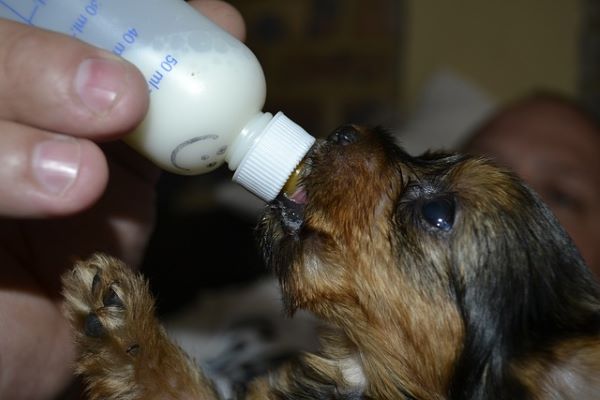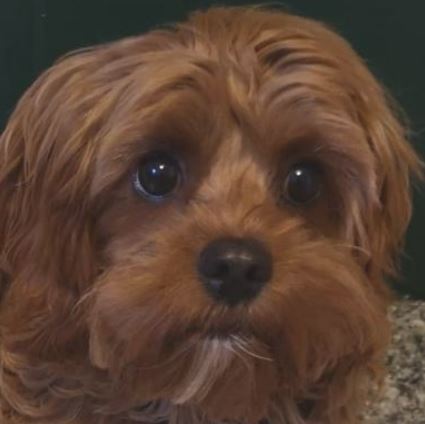Explore the reasons why is milk is coming out of your puppies nose, understand its implications on canine health, and learn safe feeding techniques.
Imagine cradling your adorable new puppy, feeding it a bottle, and suddenly you see milk trickling out of its nose. Alarming? Yes. Unique? Not quite. It’s a phenomenon that's more common than you'd think, but also one that could potentially signal an underlying health concern.
Welcome to the intricate world of canine health where even the smallest details, such as milk dribbling from a puppy's nose, hold profound importance. As we delve into the curious case of why milk might come out of a puppy's nose, we'll navigate through the labyrinth of puppy anatomy, feeding techniques, and potential health issues, unravelling this seemingly peculiar occurrence.

Understanding Milk Coming Out of Puppies Nose
Puppies are so cute with their little noses and playful personalities. But why is milk coming out of them?
Young puppies often have milk dribbling from their noses while nursing. This happens when they struggle with the technique and swallow air, pushing the milk up through their sinuses.
No need to worry! As long as the pup is growing and developing normally, it's nothing to be alarmed about. But if milk is coming out of its nose even when not nursing, or if there are other symptoms like coughing or wheezing, it's best to consult a veterinarian.
A friend once shared how her puppy's enthusiasm made milk come out his nose. She found it endearing and couldn't help but laugh. Messy quirks like this just add to a puppy's charm. So why cry over spilt milk when you can laugh?
Causes of why Milk is coming out of Puppies Nose
To understand why milk is coming out of your puppy's nose, you need to examine the causes behind it. In order to ensure proper feeding and health, it's crucial to be aware of all possible factors. This section will explore various reasons that contribute to this issue. Four sub-sections - Overfeeding, Incorrect Feeding Technique, Swallowing Air During Feeding, and Congenital Health Condition - will shed light on the root causes of milk coming out of your pup's nose.
Overfeeding
Too much slurping can be a pup's undoing! Excessive milk intake can cause regurgitation - food that's too big for the stomach to hold comes back up. It may come out of their nose, resulting in nasal discharge and coughing.
Be mindful of your pup's dietary needs; avoid overloading their tummy. Scheduling regular meals throughout the day with enough time gaps between each feeding is key to keeping them healthy. Refrain from exceeding recommended portion sizes too.
Lack of essential nutrients due to overindulgence can lead to malnutrition and delays in growth. Guard your pet's wellbeing by monitoring their eating habits. Gradually wean them off with smaller meal portions until they form healthier eating habits and are less likely to experience regurgitation.
Don't put your pup at risk! Keep an eye on their food intake and make sure you look after them properly.
Incorrect Feeding Technique
Feeding puppies incorrectly can cause milk to come out of their nose. This is called Nose Milk Syndrome. It is caused by various factors, such as overfeeding, incorrect positioning and interrupting nursing sessions.
Prevent this by:
- Checking feeding position: The puppy's head should be slightly above the body.
- Having small, frequent feedings: Offer smaller and more frequent meals, instead of large ones.
- Limiting milk flow: Use a nipple that restricts flow.
- Cleaning the nose: After feeding, clean the puppy's nose.
This syndrome can be genetic too. It is seen in many species, including dairy cows. If symptoms persist, veterinary attention is needed. This can help prevent respiratory distress or pneumonia.
One dairy farmer had troubles raising calves due to Nose Milk Syndrome. He changed his milk replacer to a thicker consistency and got regular veterinary attention. This improved the health of his herd.
So, why not just wait for your pup to shoot milk out of their nose, like a mini dairy cannon?
Swallowing Air During Feeding
Nursing pups can sometimes swallow air when drinking milk. This is called 'Aerophagia'. It causes bloating and gas, and can be worse with poor latching or teat abnormalities.
To stop this, try adjusting the bottle's angle. Feed the pups slowly, in small portions. Get a bottle nipple that fits their size, so they don't get tummy aches.
Small meals often, and walks after meals, can also help. Regular checkups can assess if a pup has aerophagia. Unlike humans, pups with health conditions can still drink milk without getting it up their nose!
Congenital Health Condition
Some puppies can be born with congenital health conditions that may make it hard to eat. These can be inherited from their parents and cause an incomplete closure of their palate. This can lead to milk coming out of their nose while they feed.
Pugs and Bulldogs may be more prone to such conditions, where gaps in the mouth or nose mean food and liquid can easily pass through the nasal passages.
Vets may help control the feeding behaviour or suggest special surgeries to seal the palates or clefts.
To help prevent milk coming out of puppies' noses during feeding sessions, changing the feeding posture or using syringes with a nipple attachment may help. Also, avoid watching cute puppy videos while drinking milk!
If you are interested in "When you can hear your puppies heartbeat" read it here.
Prevention and Treatment of Milk Coming Out of Puppies Nose
To prevent and treat milk coming out of your puppy's nose, use the following techniques with the listed sub-sections as solutions: Adjust feeding technique, control feeding volume, monitor puppy's health, and seek veterinary care if necessary.
Adjust Feeding Technique
When it comes to stopping and treating milk coming out of puppies' noses while feeding, there are some techniques to try. Most importantly, changing the feeding approach is critical to stop this from happening often.
To adjust feeding techniques, take these steps:
- Use a smaller nipple on the bottle to control the flow of milk.
- Hold the bottle at a 45-degree angle so the pup won't gulp too much.
- Don't force-feed, as this could be uncomfortable and lead to regurgitation.
- Observe the puppy's reaction while feeding. They may signal when they need a break or have had enough.
It's important to note that monitoring puppies during their feedings can help detect any issues early. This should stop frequent episodes of milk coming out of their nose.
Also, giving drops of clean water between feedings helps prevent dehydration.
Pro Tip: Always track each pup's progress and make changes to their feeding plan if needed. Don't let your puppy guzzle milk, or else you'll get a milk fountain show!
Control Feeding Volume
Control pup milk intake with 'Precise Milk Dosage Control'. Stop it from reaching their noses and causing discomfort. Here is a 4-step guide for this technique:
- Check the amount of milk puppies consume in each session.
- Adjust the feeding volume to their growth, weight and behaviour.
- Use a syringe with controlled flow rate to give exact amounts.
- If required, break down the amount into smaller, more frequent meals.
Remember, pup appetites and nutrition needs differ. Observe their eating habits - if they look bloated or restless after a certain amount of milk, adjust accordingly.
Pro Tip: Clean and sterilize all feeding equipment before use. Prevent bacteria buildup and puppy infections.
It's like running a hospital - check for fleas and monitor milk intake!
Monitor Puppy's Health
Regular health checkups for puppies are a must! Schedule routine vet visits to identify any existing or potential issues, vaccinate, and provide vital nutrition and exercise advice. Monitor health from an early age and be attentive to behaviour, appetite, or growth changes that could denote problems. Immunization schedules should be followed according to region-specific risks. Professional guidance is key in maintaining your pet's well-being - don't wait for an emergency to strike. Make it a habit to schedule the next appointment when checking out from the current one. With proper care and attention, your furry friend will blossom into a healthy adult dog! Don't Google their symptoms - leave it to the professionals and seek vet care when needed.
Seek a Veterinary Care If Necessary
If your pup has milk coming out of its nose, get help fast if the condition doesn't improve. A vet will inspect their symptoms and give medical advice. Treatment options can range from antibiotics or allergy meds to surgery. Timely treatment stops further health issues and discomfort.
Watch your pup closely when it's recovering. Signs of relapse could be from blockages or developmental issues. Take note of feeding behaviour, growth, water intake and get regular check-ups. Proper hydration and nutrition help your pup's respiratory performance.
Seeking vet care is necessary if your pup has continuous milk coming out. This can prevent discomfort and death. Nutritious food, check-ups and hygiene will make sure your pup recovers.
